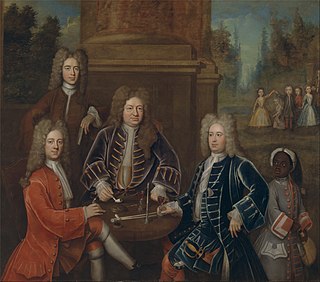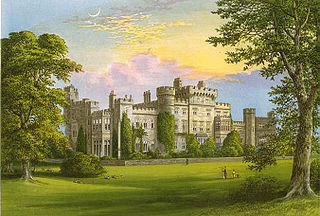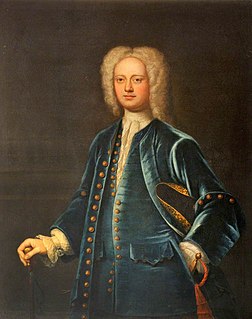Related Research Articles

Sir George Bowes was an English coal proprietor and Whig politician who sat in the House of Commons for 33 years from 1727 to 1760.

Lord James Cavendish FRS of Staveley Hall, Derbyshire was a British Whig politician who sat in the English House of Commons between 1701 and 1707 and in the British House of Commons between 1707 and 1742. He was also a member of the Cavendish family.

Sir John Glynne, 6th Baronet was a Welsh politician and landowner.
Flint Boroughs was a parliamentary constituency in north-east Wales which returned one Member of Parliament (MP) to the House of Commons of the Parliament of the United Kingdom and its predecessors, from 1542 until it was abolished for the 1918 general election.
Hugh Williams, of Chester, was a Welsh Whig politician who sat in the House of Commons from 1725 to 1734.
Sir Roger Mostyn, 3rd Baronet, of Mostyn Hall, Holywell, Flintshire, was a Welsh Tory politician who sat in the English and British House of Commons for 25 years from 1701 to 1735.
John Griffith (V) was a Welsh politician who sat in the House of Commons from 1715 to 1740.
The Flint Boroughs by-election was a Parliamentary by-election. It returned one Member of Parliament (MP) to the House of Commons of the United Kingdom, elected by the first past the post voting system.
Edward Rudge, of Evesham Abbey, Worcestershire, was an English politician who sat in the House of Commons between 1728 and 1761.
Thomas Salusbury, of Shotwick Park, near Chester, born as Thomas Brereton, was a British Whig politician who sat in the House of Commons between 1724 and 1756. He was also Lord Mayor of Liverpool.
Sir Roger Mostyn, 5th Baronet was a Welsh landowner and politician who sat in the House of Commons for 38 years from 1758 to 1796.

Sir John Conway, 2nd Baronet of Bodrhyddan Hall, Rhuddlan, Denbighshire was a British landowner and Tory politician who sat in the House of Commons between 1685 and 1721.
Charles Leigh (1686–1749) of Leighton Buzzard, Bedfordshire was a British politician who sat in the House of Commons between 1710 and 1734

John Forbes, of Culloden, Inverness, was a Scottish politician who sat in the Parliament of Scotland from 1704 to 1707 and in the British House of Commons from 1713 to 1727. He was known as ‘Bumper John’ from his enduring belief that ‘another bumper’ would cure all ills
Robert Pigott (1665–1746) ), of Chetwynd, Shropshire and Chesterton, Huntingdonshire, was an English landowner and Whig politician who sat in the House of Commons between 1713 and 1741.

William Northmore (1690–1735), of Northmore House, Okehampton and Cleve, near Exeter, Devon, was a British landowner and Tory politician who sat in the House of Commons between 1713 and 1735.
Sir Robert Kemp, 3rd Baronet (1667–1734), of Hoxne and Ubbeston, Suffolk, was an English landowner and Tory politician who sat in the House of Commons between 1701 and 1734.

Sir George Wynne, 1st Baronet, of Leeswood Hall, Flintshire, was a Welsh land owner and Whig politician who sat in the House of Commons from 1734 to 1742.
Sir Thomas Mostyn, 4th Baronet, of Mostyn, Flintshire, was a British landowner and Tory politician who sat in the House of Commons between 1734 and 1758.
Edward Kynaston, of Garth and Bryngwyn, Montgomeryshire and Hardwick, Shropshire, was a British landowner and Tory politician who sat in the British House of Commons between 1734 and 1772.
References
- 1 2 3 "LLOYD, Salusbury (d.1734), of Leadbrook, Flints". History of Parliament Online. Retrieved 10 January 2019.